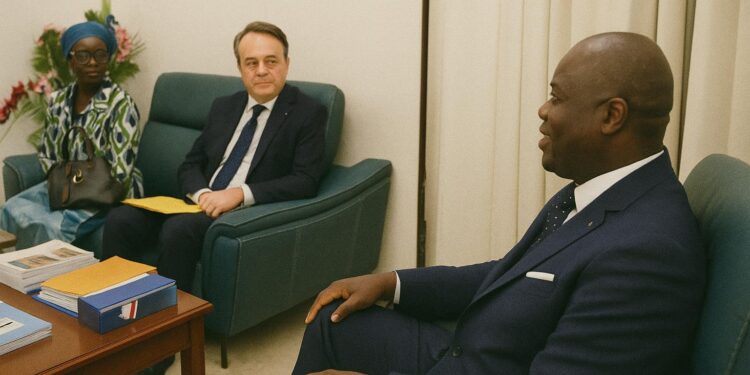Brazzaville at the Center of the Mattei Vision
In a move that raised more eyebrows in Silicon Valley than in the corridors of Rome, Italy designated the Republic of Congo as the pilot country for the Mattei Plan for Africa, an initiative marketed as capable of nurturing half a million technology start-ups.
The selection was formalized at a July meeting in Brazzaville between Italian ambassador Enrico Nunziata and Minister of Posts, Telecommunications and Digital Economy Léon Juste Ibombo, who both described the program as “the most ambitious chapter of bilateral cooperation since hydrocarbons,” according to two officials present.
From Memorandum to Momentum
A memorandum of understanding signed in Rome on 19 June sketched five priorities—education, health, agriculture, climate and governance—with digital technology acting as the connective tissue.
Officials in both capitals insist the text goes beyond diplomatic boilerplate; it commits Italy’s CDP Venture Capital fund and private groups such as ENI to anchor early-stage financing windows in Brazzaville before rolling them out across Africa.
Youth-Centric Digital Diplomacy
Demographically, Congo’s median age hovers around 19, while unemployment for graduates is estimated at 30 percent by the World Bank.
Italian planners argue that channeling capital into coding boot camps, telemedicine pilots and precision-agriculture labs can turn a demographic bulge into a dividend.
“We want Congolese youths to design solutions for Gabonese forests, Ethiopian coffee or Moroccan ports,” Nunziata told this magazine, suggesting that Brazzaville could become a bilingual innovation hub bridging Francophone and Lusophone Africa.
Capital Gaps and Regional Balances
The optimism is tempered by numbers: according to Partech, Egyptian, Nigerian, South African and Kenyan start-ups absorbed 83 percent of Africa’s venture funding in 2023, leaving Central Africa with less than 2 percent.
By pledging to seed 500 000 ventures continent-wide, Rome hopes to dilute this imbalance, yet analysts warn that scale does not automatically equal inclusiveness if local angel networks and regulatory clarity are missing.
Congo’s one-stop-shop for business registration, launched in 2019, reduced paperwork from 45 to three days, but entrepreneurs still cite high broadband costs and a paucity of domestic VC funds.
Implications for Congo’s Innovation Ecosystem
If the pilot succeeds, Brazzaville stands to host a regional acceleration center staffed by Italian universities and Congolese engineers, mirroring the Polihub model in Milan.
Such visibility could attract secondary funding from the African Development Bank, whose Digital Moonshot program earmarks two billion dollars for connectivity corridors.
Local authorities discreetly admit that the initiative also serves a reputational purpose, presenting Congo as a stable entry point between the Gulf of Guinea and the Great Lakes at a moment when several neighbors face political turbulence.
Financing Mechanics and Oversight
Under the pilot, start-ups will apply through a digital portal co-developed with the Congolese Agency for the Regulation of Post and Electronic Communications; proposals endure a two-tier review by Italian venture analysts and a Congolese public-private committee to ensure alignment with national development plans.
Seed tickets will average 30 000 euros, complemented by convertible notes of up to 200 000 euros for firms that reach predefined milestones in revenue or social impact, according to draft guidelines circulating among prospective investors.
Oversight will be handled by a joint evaluation board chaired by the African Union Development Agency, a decision partly aimed at diffusing criticism that European funds sometimes bypass continental institutions.
Transparency International’s Central Africa coordinator notes that Congo’s recent digitization of treasury payments “has lowered leakage risks,” yet still recommends public dashboards for the Mattei disbursements to cement trust among taxpayers and foreign backers alike.
Italian senators supportive of the plan argue that success in Congo could unlock a new chapter of European engagement predicated on entrepreneurship rather than extractive concessions, a pivot they say honors the legacy of Enrico Mattei, the ENI founder who championed equitable energy partnerships in the 1960s.
For Congolese start-ups accustomed to pitching in cafés with patchy Wi-Fi, the program’s promise of structured mentoring feels almost revolutionary.
Navigating Geopolitical Currents
The Mattei Plan comes as Russia intensifies security cooperation in the Sahel and China deepens digital infrastructure projects across Central Africa, heightening competition for influence.
By packaging development assistance with venture capital, Italy bets on soft power through keyboards rather than kiosks, aligning with the European Union’s Global Gateway but maintaining its own brand.
For President Denis Sassou Nguesso, who attended the Italy-Africa summit in January, the pilot enhances diplomatic bandwidth without forcing Brazzaville to choose between East and West, a posture diplomats label “multi-vector pragmatism”.
Deliverables will ultimately decide whether the rhetoric of half a million start-ups survives the banquet circuit; the first tranche of seed grants is scheduled for disbursement in early 2025, with impact metrics to be made public every quarter, officials say.
For now, young coders at Brazzaville’s Burospace hub are less concerned with geopolitics than with latency issues; as one quietly quipped, “If Rome can get us fiber under fifty dollars a month, the rest of Africa will follow”.











































